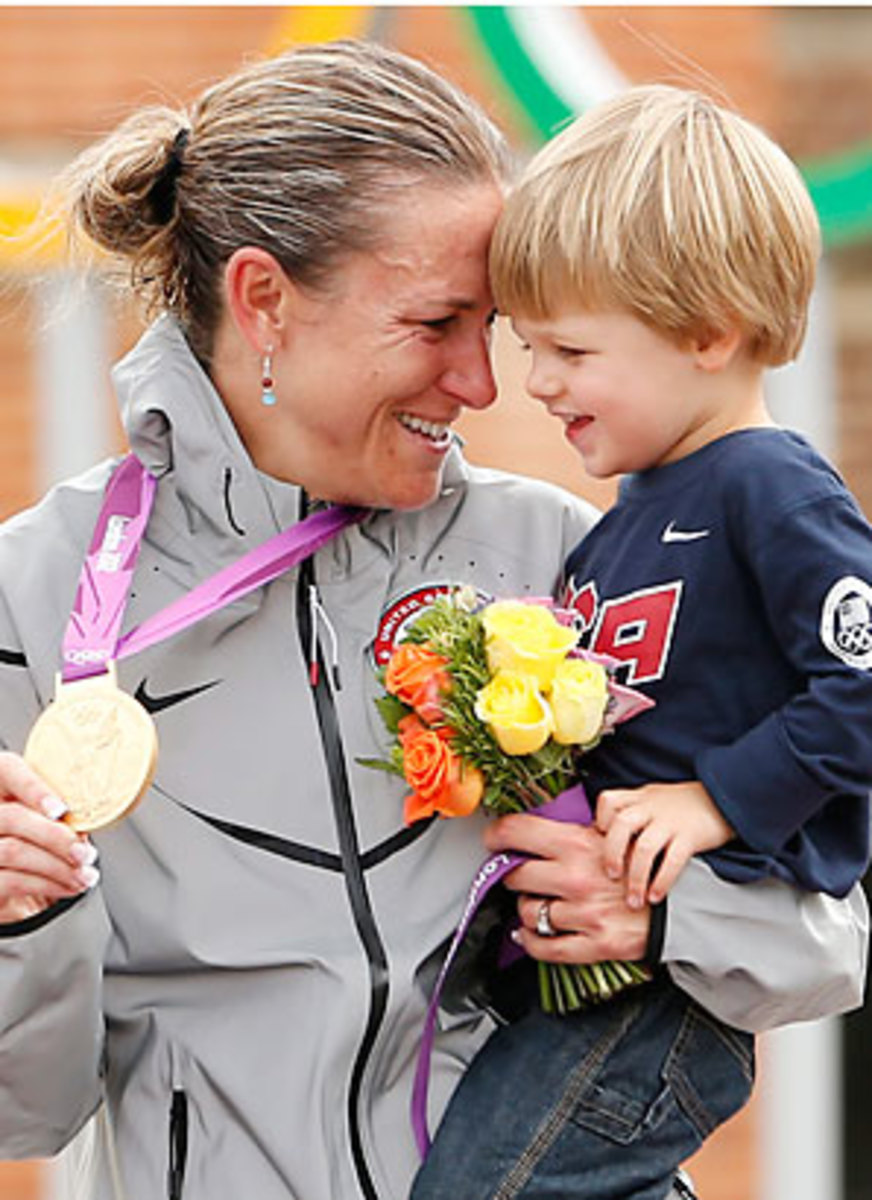Armstrong, Wiggins shy from regal status borne of gold medal wins
HAMPTON COURT, England -- Absent the presence of actual princes and princesses, duchesses and dukes, there can be no more royal a backdrop for any venue at these Games than the 500-year-old Hampton Court Palace, whose red-bricked battlements once looked down on Henry VIII himself.
In both miles and milieu, it's tough to get much further from this place than Boise, Idaho, hometown of Kristin Armstrong. And yet there was something undeniably regal about Armstrong as she stood atop the podium, gold medal draped around her neck, for the second summer Games in a row. Twenty-two months after giving birth to her son, Lucas, and 10 days before her 39th birthday, Armstrong successfully defended her title in the women's time trial. The ex-triathlete powered around the 29-kilometer course in 37 minutes, 34 seconds -- 15 seconds faster than Germany's Judith Arndt, who took silver.
The Brits have a queen. Their American cousins have the queen of the time trial.
Armstrong's repeat was overshadowed -- on this blessed plot, at any rate -- by the victorious arrival two hours later of Bradley Wiggins, whose 42-second margin of victory over Germany's Tony Martin was so fat that it looked like a typo on the results sheet. Wiggo's gold provoked a paroxysm of joy and relief in the hundreds of thousands of fans lining the 49-kilometer course. Many in this host nation had awakened in a peevish mood, on account of Team GB's failure to have bagged a single gold medal, nearly a week into the Games. "We need to be patient," one Lord Moynihan told The Daily Telegraph, "and we'll see that the medals and gold medals will follow."
Before Wiggins could bear him out, British rowers Helen Glover and Heather Stanning won gold in the coxless pairs. That feat might've taken some of the pressure off Wiggins, although the unflappable 32-year old didn't seem to be feeling much pressure to begin with. After winning the 3,500 km Tour de France, he'd said, on the eve of the TT, "an hour time trial to make history should be a doddle."
Sitting in the Palace courtyard's ceremonial throne that Armstrong had occupied before him, Wiggins flashed dueling peace signs. The woman from Boise, ironically, had a more royal aura about her. Wiggins wouldn't have it any other way. Asked how he liked the ring of "Sir Wiggins" -- as a Tour de France winner and four-time gold medal winner, he is a prime candidate to be knighted -- the willfully proletarian Wiggins replied, "Doesn't quite sound right, does it?" Given a decree declaring him a knight, he predicted, "I'd just put it in a drawer."
Shortly after clinching the win, Wiggins remounted his bike and took a spin away from the Palace, outside the secure zone. Where on earth was he going? To be with his people, explained. "That's where the real fans are."
Armstrong thought of her people, too, throughout her effort. The helicopters hovering over reminded her that the folks back in Boise would be watching. "I have to put on a show," she told herself.
"These last 20 months have been a roller coaster," she allowed, post-race, "but I wasn't going to let anyone see that."
The comeback seemed like a great idea at the time, recalled Armstrong's coach, Jim Miller, who is also USA Cycling's vice president of athletics. "But last spring was really hard." As will happen with a newborn in the house, Armstrong's sleep was often interrupted. "Any time we had really good training blocks going, she'd get sick."
The Lucas Factor changed everything. "The way we did it before was very focused, very -- you hate to say selfish," he recalls, "but it was about her. And this time it couldn't be all be about her. It had to be about Lucas and he had to be included. Even simple things like going to races" were altered by the fact that "you have a baby in tow. You normally don't have plastic toys at the start of a stage race."
It took nearly a full year for Armstrong to return to the superb form she'd taken into the 2008 Olympics.
At which point she promptly snapped a clavicle in a crash at the Exergy Tour in her hometown of Boise. Miller wasn't overly worried, he says. The truth about this sport is that if you haven't broken a collarbone lately, you're not really trying. Armstrong had surgery the next morning, was on an indoor trainer three days later, and was riding outside within five days.
She had another reversal of fortune in last Sunday's Olympic road race, when an inferior bike handler took her out on a rain-slicked hairpin turn. Armstrong suffered bruises and abrasions, but was otherwise OK. But the misfortune preyed on her mind. At one point, she recalls thinking, "OK, broken collarbone, crash -- don't they say bad luck comes in threes?"
But she pushed those thoughts out of her mind, and tried not to be alarmed by her practice ride on the eve of the time trial ("I felt awful".) She made the Lucas Factor work in her favor. While some of her competitors allowed themselves to be distracted by the commotion in the Olympic Village, and by the hour-long, traffic-congested drive to the venue for practice rides, "I was like, 'I'm a mom, and this is the most calm moment I've had in 22 months. This is not taking any energy out of me, but I saw it sucking energy out of everyone around me.'"
Before stepping off the podium, Armstrong gathered Lucas in her arms. Her son has already played with her medal from Beijing, she reported, and would be welcome to teeth on this one as well. The London version has more heft -- "it's less fragile," said Armstrong, raising her voice to be heard above the helicopters.






